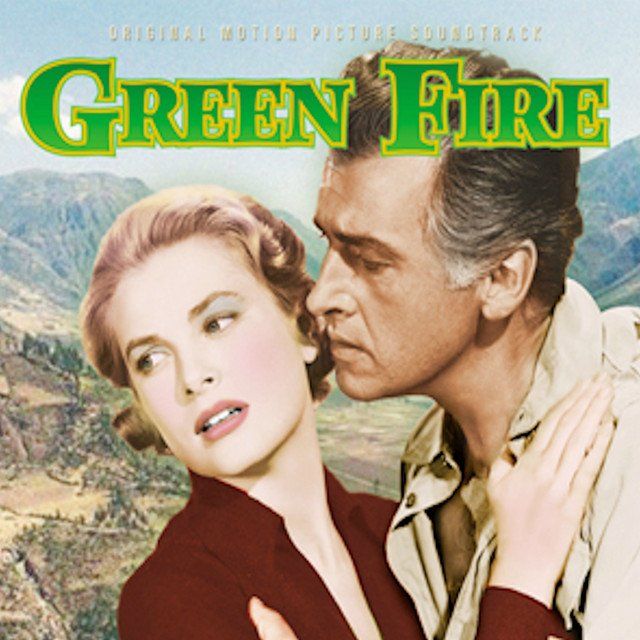Green Fire / Bhowani Junction

Label: Film Score Monthly
Catalogue No: FSMCD Vol. 6 No. 5
Release Date: Apr-2003
Total Duration: 77:49
UPN: 6-38558-01542-1
This Film Score Monthly is a very enterprising set, combining two scores by Miklós Rózsa for mid-1950's MGM exotic adventures both starring Stewart Granger and featuring two of the top leading ladies of the day, Grace Kelly and Ava Gardener.
The heart of the album, or at least the main selling point, is the 36 minute long stereo soundtrack to Green Fire (1954). It's something of a surprise to find that most purist of film composers delivering, after a typically robust 22 second introduction, a pop-choral title song in standard 1950's style but with delicate percussive accompaniment. The words are trite, sentimental nonsense, but as the whole thing only lasts 70 seconds it can easily be overlooked due to the real riches which follow this ode to emeralds and true love. "The Lost Mine" flows directly out of the title song and has a delicate scene-setting fantasy which calls to mine the composer's fabulous invention for The Thief of Bagdad (1940). "The Leopard" finds Rózsa penning increasingly fraught suspense music in his very familiar rugged idiom, brass well to the fore, while "Mining" presents an urgent orchestral variation on the title song, a melody which permits the score in various imaginative guises. It is writing which anticipates some of the more tormented and despairing sequences from Ben-Hur (1959).
Two versions of "Tropical Night" (revised and original) find romance in the jungle, while exotic colourations and a heartfelt yearning quality are both again are suggestive of The Thief of Bagdad. The revised version, which is heard first, is more full-blooded, the original, rather more delicately scored and lyrical. Both are highly enjoyable. What follows finds the composer in excellent form, with two more romantic pieces, "Confessions" and "Romanza" before a montage of "Showdown/Green Fire/Nocturnal Visit/Speech Without Words" which has the novelty of presenting a version of the title melody for guitar and mouth-organ which would seem more at home in a Western than a South American adventure. "Nocturnal Visit" is a playful, light cue paying a little nod in the direction of the composer's Jungle Book (1942).
Adopting all the colours of a Latin fiesta, the first half of "Boulder/Death" kicks the album into colourful life, the mood soon changing to intense dramatic urgency for the second part of the track. The sombre "Grave/Alone" introduces two darkly orchestrated melodies which may remind younger film music aficionados of Rózsa's late, great work on Time After Time (1979), the propulsive "Bonus" which opens track 11 continuing in comparable vein. Then comes a real surprise, a vibrant, dance melody for a "Sluicing" scene which is accompanied by the percussive pulse of what sounds for all the world like an old fashioned manual typewriter. It works too, even if the rhythms of the orchestra and typewriter, if that is what it is, do not always precisely lock together.
As the score builds towards its finale the music becomes increasingly powerful and explosive, the rising tension and aching romance of "El Moro" surrendering to the frantic "Courage/Detonator/Fight", blistering action music as ferocious as any found in a modern summer blockbuster. Indeed, there is a clockwork percussive riff which, along with at least one of the brass motifs, was reworked into Time After Time. The "Finale" restates the title song, demonstrating that inappropriately commercial end-title ballads are perhaps not as recent a phenomena as is often supposed.
All in all this is a splendid score and the 1954 stereo sound is almost unbelievably good. Rich, powerful and detailed, with barely a hint of distortion, this is a recording decades ahead of what we generally are used to hearing from this period. After the score proper we find virtually quarter-of-an hour of bonus material, including instrumental versions of the main and end titles, a guitar version of "Green Fire" and various South American dances.
Next comes 27 minutes of music from the 1956 release, Bhowani Junction, including a 10 minute "Bonus Suite". For this Indian-set drama Miklós Rózsa composed perhaps the least typical score of his career. Indeed, for those who did not know, I doubt many would ever find the composer's fingerprint in this music. Considerably ahead of its, rather than follow the typical Hollywood scoring approach, the music for Bhowani Junction was written to sound like, as used as, source music. The cues, often played at low level in the film, were composed to directly evoke the street sounds of India. Miklós Rózsa was an ethnomusicologist as well as a gifted composer, and to the untrained ear he appears to have succeeded wonderfully well. Others with far greater knowledge of Indian music may beg to differ; at the very least this sounds authentically Indian to the general listener, rather than being Western music dressed in superficial Indian colours. The stereo sound is also remarkably good for a 1956 recording. That said, though a landmark score for its approach, many film music fans, unless they also have a particular interest in Indian music too, may well find this of little, no, or only academic interest. If so at least there is the unmistakable sound of Rózsa to enjoy in his excellent traditional Hollywood score for Green Fire.
Originally published at MusicWeb International - Text reproduced by kind permission
Gary Dalkin is a freelance editor. Books he has worked on include John Barry: The Man With The Midas Touch (revised 2nd edition), by Geoff Leonard, Pete Walker and Gareth Bramley, and The Struggle Behind the Soundtrack: Inside the Discordant New World of Film Scoring, by Stephan Eicke. You can find out more about Gary and contact him via his website - To The Last Word



